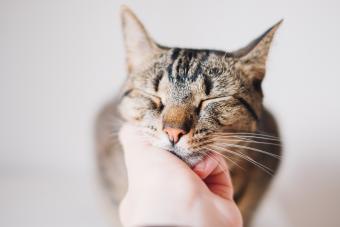
Cats have a complex range of emotions. In fact, they have more emotional intelligence than many originally thought. But does that mean cats can process complex emotions like guilt and remorse? Cats form strong social bonds with their people, and they definitely understand emotions. But cats tend to live in the "Now," and guilt requires feeling bad about something that happened in the past.
Do Cats Actually Feel Guilty?
Although cats do experience emotions, they don't seem to feel the complex emotion of guilt. Rather, when cats act "guilty," they're most likely responding to their person's anger or scolding.
Cats do bond deeply with their owners and can recognize feelings of anger or frustration, and they absolutely understand you aren't happy with them. But they lack the "meta-cognition" - the ability to think about their emotions - that is required for feelings like guilt to occur. Cats don't hold grudges, for the same reason.
For example, if a cat uses your brand new sofa as a scratching post, they're not going to have a second thought about it. That is, until you catch them in the act and become upset. Then, their response may be to run away or hide for a little while. This doesn't mean your cat is feeling guilty, but rather they are reacting to your response.
Do Cats Understand Their Actions Can Hurt Others?
Cats are intelligent animals with the ability to learn and adapt to their environment. They can develop an understanding of cause and effect to some extent, which may include understanding that their actions can have consequences on others. However, their understanding of these consequences might be more limited compared to humans.
Cats might learn that certain behaviors, like biting or scratching, can cause pain or discomfort to others through trial and error, or by observing their owner's reactions. Then, they may not bite or scratch because they know it may harm you - and how you will react. They learn to alter their behavior based on the reactions of other cats or animals they interact with.
Despite this, cats may not have a deep or complex understanding of how their actions can affect others emotionally. Their primary focus is usually on meeting their own needs, and they may not be capable of the same level of empathy or moral reasoning as humans. In essence, they can learn to understand cause and effect, but they aren't going to truly understand if they hurt your feelings.
There is limited research on a cat's understanding of cause and effect, and further research is being conducted to dive deeper into their understanding.
Do Cats Ever Apologize?
Since cats don't feel guilt, they aren't capable of apologizing to you. Cats do understand when you're angry or upset through your tone of voice and body language, though. This means when you're not feeling quite yourself, your cat may rub up on you and ask for your attention. However, this is not a reaction to anything they have done. Rather, your cat senses how you're feeling and are showing empathy.
Do Cats Even Have the Memory to Feel Guilt and Remorse?
Cats have excellent memory, although it's selective. Cats retain certain memories, such as how to get home, certain smells, various sounds, and other memories that have influenced them. However, just because they have a good memory, that doesn't mean they associate your past feelings with their actions. That requires a complex "theory of mind" - or the ability to understand your mental states - which they lack.

How to Get Cats to Stop Bad Behavior
Stopping your cat's bad behavior depends somewhat on the particular misdeeds you're dealing with, whether they're scratching, biting, or peeing outside the litter box. However, a few general tips apply across the board. How you address your cat's bad behavior depends on what they're doing. There are some general rules that can help with whatever behavior they're showing, including:
- Never yell or hit your cat for their behavior. Not only will this not get you the right attention, it will make your cat afraid of you and hurt your bond.
- Rule out any medical causes for your cat's behavior, especially if it involves not using the litter box or something similar.
- Make sure they're not being territorial or resource guarding if you have more than one cat. You should also ensure you're spending some time with each cat.
- Utilize positive reinforcement for behavior-based training. Avoid scolding your cat, as this can damage your bond.
If you damage your cat's trust, it could take a significant amount of time to earn it back, and possibly prevent a strong bond from forming with humans.
How Cats Communicate Emotions
Cats communicate their emotions through a combination of vocalizations, body language, and behaviors. Here are some ways cats express their emotions:
- Vocalizations: Cats have different vocalizations to express how they're feeling. A cat who is happy is likely to purr, although purring can also mean they're upset. Cats that meow are often attention-seeking. Cats that hiss and growl may be angry, upset, or frightened.
- Body language: Similar to dogs, cats also have their own set of body language indicators. A raised tail indicates a happy, confident cat, while a tucked or lowered tail can suggest fear or submission. A puffed-up tail typically indicates agitation or fear. Ears that are upright and facing forward signify a relaxed, attentive cat. Ears flattened against the head or rotated outward can indicate fear or aggression. Slow blinking can be a sign of trust and contentment, while wide-open eyes with dilated pupils may show fear or excitement.
- Behaviors: When cats rhythmically push their paws in and out against a soft surface, it usually signifies contentment and affection. Cats often rub their faces or head against objects or people to mark their territory or show affection. A cat that is arching could be feeling defensive, whereas a cat exposing their belly may be showing trust and relaxation.
Combine your cat's body language with their vocalizations to obtain a full-picture view of how they're feeling.
Cats Can Read Your Signals
Cats don't feel guilt, but they can tell when you aren't acting like yourself. When you get upset with them, you will notice them rubbing up against you in an attempt to gain your attention and affection, but this is probably a reaction to the signals you're putting off. If your cat is doing something they shouldn't, use positive reinforcement training to prevent the behavior and remain patient while you get the behavior under control.







